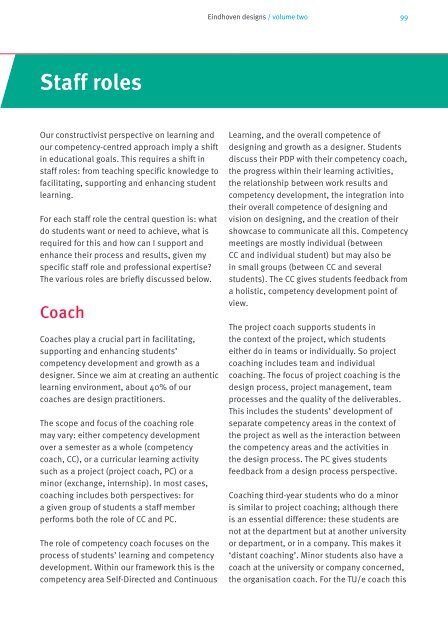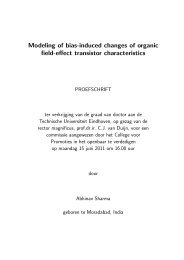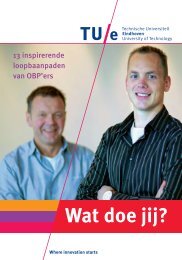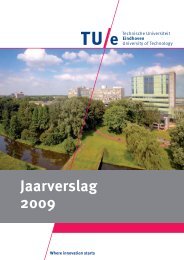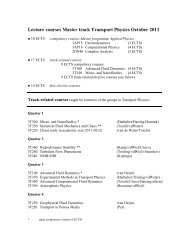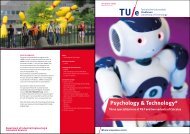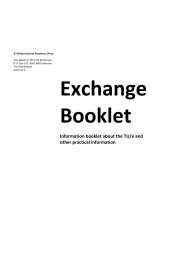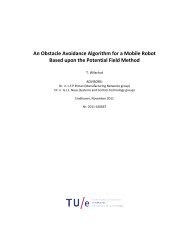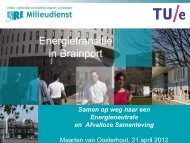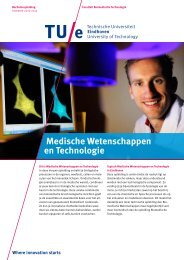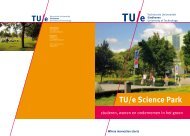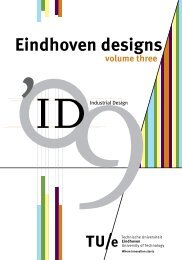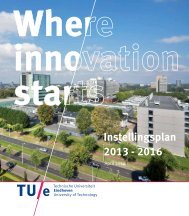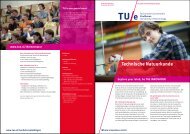Education guide 'Eindhoven designs' - Technische Universiteit ...
Education guide 'Eindhoven designs' - Technische Universiteit ...
Education guide 'Eindhoven designs' - Technische Universiteit ...
You also want an ePaper? Increase the reach of your titles
YUMPU automatically turns print PDFs into web optimized ePapers that Google loves.
Eindhoven designs / volume two 99<br />
Staff roles<br />
Our constructivist perspective on learning and<br />
our competency-centred approach imply a shift<br />
in educational goals. This requires a shift in<br />
staff roles: from teaching specific knowledge to<br />
facilitating, supporting and enhancing student<br />
learning.<br />
For each staff role the central question is: what<br />
do students want or need to achieve, what is<br />
required for this and how can I support and<br />
enhance their process and results, given my<br />
specific staff role and professional expertise?<br />
The various roles are briefly discussed below.<br />
Coach<br />
Coaches play a crucial part in facilitating,<br />
supporting and enhancing students’<br />
competency development and growth as a<br />
designer. Since we aim at creating an authentic<br />
learning environment, about 40% of our<br />
coaches are design practitioners.<br />
The scope and focus of the coaching role<br />
may vary: either competency development<br />
over a semester as a whole (competency<br />
coach, CC), or a curricular learning activity<br />
such as a project (project coach, PC) or a<br />
minor (exchange, internship). In most cases,<br />
coaching includes both perspectives: for<br />
a given group of students a staff member<br />
performs both the role of CC and PC.<br />
The role of competency coach focuses on the<br />
process of students’ learning and competency<br />
development. Within our framework this is the<br />
competency area Self-Directed and Continuous<br />
Learning, and the overall competence of<br />
designing and growth as a designer. Students<br />
discuss their PDP with their competency coach,<br />
the progress within their learning activities,<br />
the relationship between work results and<br />
competency development, the integration into<br />
their overall competence of designing and<br />
vision on designing, and the creation of their<br />
showcase to communicate all this. Competency<br />
meetings are mostly individual (between<br />
CC and individual student) but may also be<br />
in small groups (between CC and several<br />
students). The CC gives students feedback from<br />
a holistic, competency development point of<br />
view.<br />
The project coach supports students in<br />
the context of the project, which students<br />
either do in teams or individually. So project<br />
coaching includes team and individual<br />
coaching. The focus of project coaching is the<br />
design process, project management, team<br />
processes and the quality of the deliverables.<br />
This includes the students’ development of<br />
separate competency areas in the context of<br />
the project as well as the interaction between<br />
the competency areas and the activities in<br />
the design process. The PC gives students<br />
feedback from a design process perspective.<br />
Coaching third-year students who do a minor<br />
is similar to project coaching; although there<br />
is an essential difference: these students are<br />
not at the department but at another university<br />
or department, or in a company. This makes it<br />
‘distant coaching’. Minor students also have a<br />
coach at the university or company concerned,<br />
the organisation coach. For the TU/e coach this


